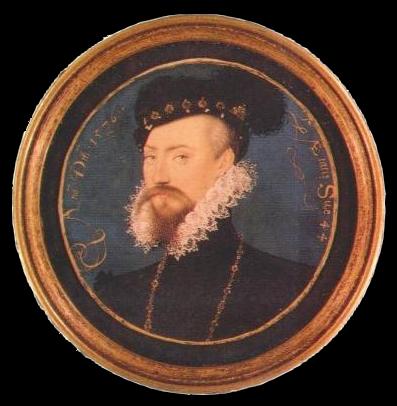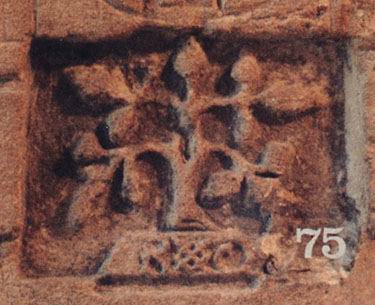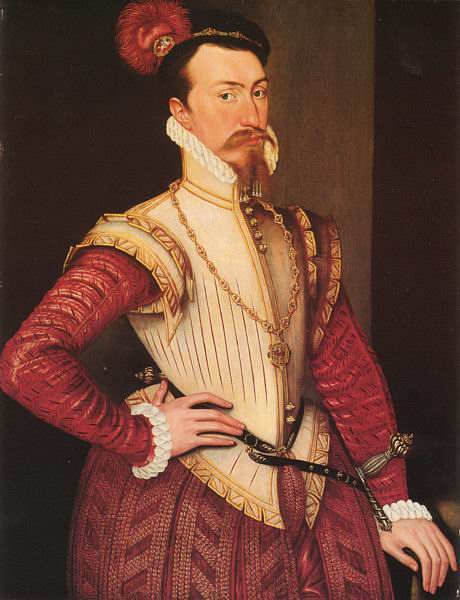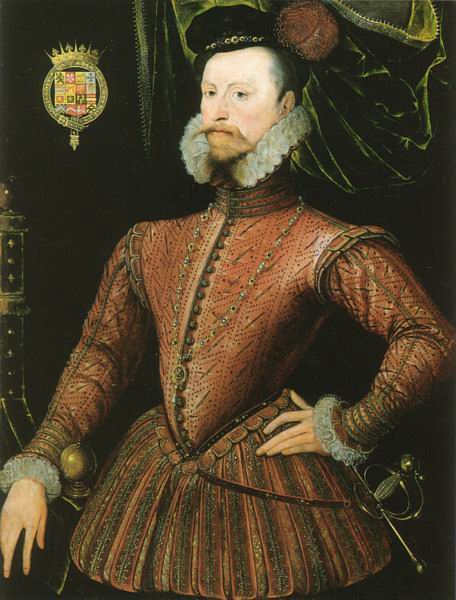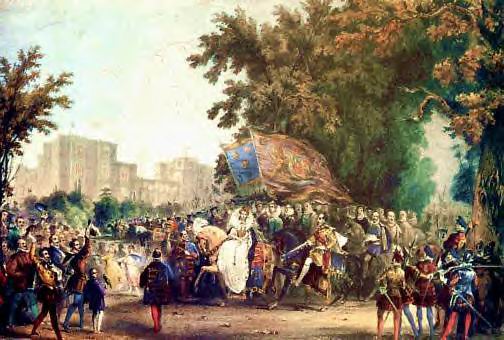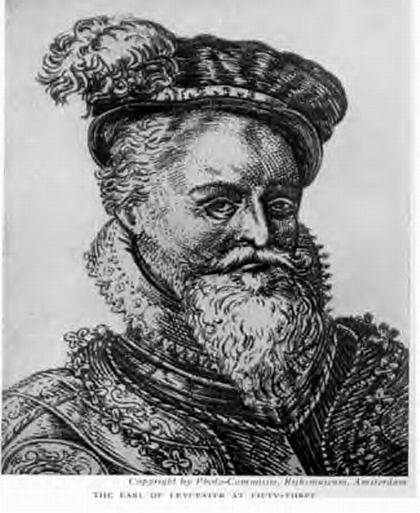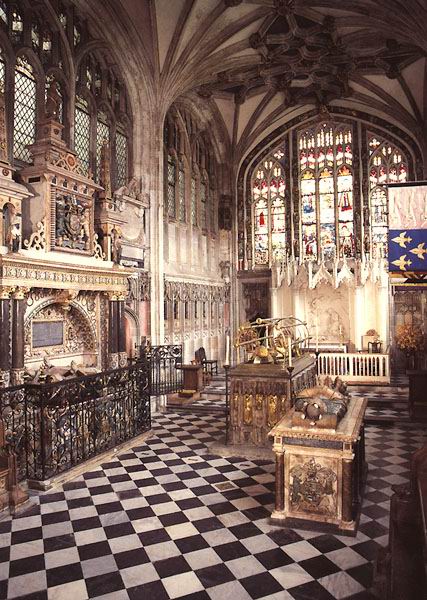|
Elizabeth I Favorite; Robert Dudley Although contemporaries believed that Robert was born on the same day, in the same year, as the Queen, it is more likely that he was at least a year older. Recent calculations put his birthday on the 24th of June 1532. He was the son of John Dudley, Earl of Warwick, Duke of Northumberland, and Protector of England during the reign of Edward VI. Robert was the fifth child of thirteen, but not all his siblings survived into adulthood, and even of those that did, only Ambrose, Mary and Catherine survived into the reign of Elizabeth I. Little is known about Catherine, who became Countess of Huntingdon following her marriage to Henry Hastings, Earl of Huntingdon, but perhaps the interest in Mary comes from the fact that she was the mother of the famous poet, Sir Philip Sidney. |
|
Robert marries Amy Robsart.... In 1550, Robert married Amy Robsart, the daughter of a Norfolk squire. Traditionally, their marriage has been seen as a love-match, but a clause in the marriage treaty suggests that it may have been for less romantic reasons. Robert was the fifth son, and therefore any marriage that could be secured for him would be advantageous. It was easier to marry off daughters than it was younger sons, as they were often not heirs to their father's lands and titles. Amy herself was an heiress, so the marriage was even more desirable in that respect. The wedding was celebrated with great style, and was attended by Elizabeth, and the Boy King himself.
|
|
Robert imprisioned in his cell is just a few steps from Elizabeths.... Following his father's attempt to usurp the throne for his daughter in law, lady Jane Grey, Robert was imprisoned with his brothers in the Tower of London. He was kept in the Beauchamp Tower, which was only a walkway from the Bell Tower, where Elizabeth was herself a prisoner after the rebellion of Thomas Wyatt. Legend has it that they saw a lot of each other during at this time, and their friendship turned to love, but this is unlikely, given that both were strictly guarded. John Dudley went to the block, and Guildford was executed along with Lady Jane following Wyatt's rebellion, but the rest of the Dudley sons were spared.
|
|
|
Robert becomes Master of the Queens horse... With the accession of Elizabeth to the throne in 1558, his fortunes changed. He was made Master of the Queen's horse, a prestigious position that required much personal attendance on the Queen, as well as organizing her public appearances, progresses, and her personal entertainment. This position suited him perfectly. Not only was he a skilled horseman, but was a great athlete, had a flair for the spectacular, and shared the Queen's love of drama and music. It was obvious from almost the beginning of her reign that he was to be her favourite. Within the first year she had lavished titles, properties, and money on him, and had spent more time with him than with anyone else. Tongues wagged at their intimacy, and it was said that they were lovers, that Elizabeth was even carrying his child. However, while such stories can easily be dismissed, it is almost certain that they were, by this time, very much in love. Perhaps it was an inevitability. They knew each other better than they knew anyone else, had suffered very similarly in the past, and perhaps most importantly, respected and trusted one another. Like any couple they argued, but Robert always treated her with the respect her position demanded, and she would allow him to behave and speak with her in ways that she would allow no one else.
|
|
Robert, being the Queens favorite, causes hatred toward him from his peers... Their familiarity, and his position as favourite, meant that he incurred a lot of hatred, and if he benefited financially from the Queen's favour, he suffered for it in other ways. By 1560, he was the most unpopular man in Elizabethan England, and remained so until his death. It seemed no one, except the Queen and his family, had a good word to say about him. No matter what he did, he was never able to shake this hostile public opinion, and it haunted him for the rest of his life. It has also coloured his reputation over the past 400 years. Elizabeth was an astute judge of character, and it is unlikely that he would have been able to maintain pretended affection for thirty years. He seems to have genuinely loved the Queen, and his behaviour at times testifies to genuine affection, rather than calculated manipulation. Had the political circumstances been more favourable, the Queen may well have married him. Privately, she told him she would marry no one else.
|
|
|
Robert's first wife's death, prevented his marriage to Elizabeth... The insuperable bar to their marriage lay in the circumstances of his wife's death. She was found dead of a broken neck at the bottom of a stair case, and many pointed the finger at Robert. For a long time people had been saying he meant to kill her so that he would be free to marry the Queen. The dissolving of a legally valid marriage was virtually unknown in Tudor times, and so divorce was not really an option for the couple. Certainly it would have made the legitimacy of any children Elizabeth had by Robert if they married, dubious. Whatever Robert's personal feelings for Amy may have been, it is incredibly unlikely that he had anything to do with her death. Amy was probably terminally ill with breast cancer as she was said to be suffering from a "malady in the breast. "Recent medical advances suggests that a woman in this condition may have a spontaneous bone fracture, and walking up the stairs of her house in Oxfordshire, may have been enough to cause a spontaneous fracture in her spine, that proved fatal. Such understandings were beyond the medical knowledge of the Elizabethans, however, and everyone, including Robert himself, thought that Amy had been murdered. Had the Queen married him, people would have believed the gossip, even that Elizabeth herself had been involved. Also, as Robert was hated only because of his monopoly of royal favour, promoting him to prince consort may have provoked a rebellion against the Queen. However, for some years, it seems that both entertained the possibility of marriage, and Robert in particular continued to hope for it for many years. He did not remarry until 1578 when it seemed certain that the Queen would not marry him. In 1575, during the glorious entertainments at Kenilworth Castle, Warwickshire, Robert made his last proposal of marriage to the Queen. As she had done in the past, she refused him.
|
|
|
Robert's second marriage to Lettice Devereux, Countess of Essex... In 1578, he married the Queen's cousin, Lettice Devereux, Countess of Essex. He may well have been in love with her, as she was certainly a very vivacious, attractive woman, but in all probability he married her because she was pregnant, and was pressurised into making an honest woman of her by her influential family. Legend has it that Robert kept his marriage from the Queen for a year, but recently this has been brought into question. It is more likely that the Queen knew of his marriage shortly after it took place. It would have been very difficult for him to hide his marriage, as his enemies would have been very eager to tell the Queen about it. Lettice miscarried of their first child, but in 1579/80 gave birth to a son ,who she also named Robert. However, the child was not healthy and died in 1584. Robert was devastated. He had idolised his little son, and with his death, died his dream of perpetuating his dynasty. He had another son, also named Robert, from his affair with Lady Dudley Sheffield in the early 1570's, but he was illegitimate, and ilegitimate children could not usually inherit their father's titles. Lady Sheffield later claimed that Robert had married her in a secret ceremony, and while this is still a popular belief, there is no evidence to support her claims, and Robert always denied it. In the seventeenth century, she brought forward a court case to try and prove that he had married her, but she was unsuccessful. Perhaps her motivation was the desire to secure for her son the estates of the Earl. It is interesting that she did not bring forth this case following Robert's death, or in the lifetime of the Queen. But while Robert's son could not inherit, Robert was a good father to him, and provided him with a respectable education. His son was very talented, and grew up to be quite a romantic figure, eloping to Europe with a maid of honuor of the Queen after her death, despite having a wife and five daughters.
|
|
Robert was made commander of the English and his death... In 1585, Robert was made commander of the English forces in the Netherlands. The Netherlands were revolting against the rule of Philip II, and the English were helping the Dutch in their campaign. Robert stayed in the Netherlands until 1587, although he did return to England during the Mary Queen of Scots crisis of 1586/7, and was present in England when Mary was executed. English involvement in the Netherlands was not particularly successful, and when he did return permanently, he received a lot of criticism for his actions there. Although Elizabeth herself had not always been pleased by what he had done, she would not hear a word said against his efforts there.
But few shared her grief. His enemies said that the rejoicing at the defeat of the Armada was nothing compared to the rejoicing at the news of Robert's death. He was given a funeral befitting a nobleman, and buried in the Beauchamp Chapel of St Mary's Church, Warwick.
|
|
|

Need a Website? We can build you one!
|


